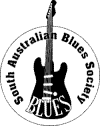South Australian Blues Society
(It's the old 1999 website I have dragged out of the archives for you to have a look at!)
BLUES WOMEN by Everlovin’ Trev
Bessie Smith – Empress of the Blues
Bessie Smith’s death as a result of an automobile accident in 1937, when she was forty-two, has become an object of myth more than fact – some sources suggest that she was the victim of racist discrimination by a white hospital – but, in a way, regardless of its accuracy, this story provides an apposite conclusion to a larger than life existence that was as turbulent and tempestuous as it was short. Smith was known for her carnal appetites, which have been described as prodigious and catholic, as well as for her singing - and the lyrics of many of her great blues songs ranged from the explicit to the prurient, perhaps giving voice to this aspect of her life. Born in 1894, by the early twenties she had been married and widowed. The relationship that was to lead to her second marriage, to Jack Gee, developed over a series of hospital visits because, on their first dinner date, Gee was wounded in a gunfight. By the end of the decade, Gee had left her for another entertainer called Gertrude Saunders, and Smith did not take kindly to this development. On one occasion she beat Saunders unconscious after the latter had drawn a gun on her.
For the last years of her life, Smith lived with a wealthy bootlegger called Richard Morgan, and she has been described as being addicted to bootleg liquor. The titles of a number of her songs refer to alcohol, tunes such as ‘The Gin House Blues, ‘Me and My Gin,’ and ‘Moonshine Blues.’ Whatever was the case, the Prohibition era, from 1920 to 1933, also increased her opportunities for employment, as they did for many other blues and jazz musicians. Many illegal bars, often owned by gangsters, provided opportunities for musicians to an extent that was never matched by their legal counterparts in other less criminal times.
By the 1930s, Smith’s singing had fallen from favour with audiences but during the twenties her records and performances were in great demand and she worked with some of the finest musicians of the period, including Louis Armstrong. After making a living by busking in the early days, her first professional engagement was in the Moses Stokes Show, a travelling minstrel show in which she worked with Ma Rainey. Smith’s first recordings were cut by Columbia in 1923 and comprised of ‘Down-Hearted Blues’ and ‘Gulf Coast Blues.’ 800,000 copies of the recording had been sold within six months. That year also saw the beginnings of her professional relationship with Fletcher Henderson, who was to become famous as a bandleader during the swing era. She also recorded with Clara Smith in 1923.
In the next year, 1924 she performed in Chicago and New York, and cut further tracks with Fletcher Henderson, and in 1925 she made several recordings with Louis Armstrong. But by 1926 public enthusiasm for the blues appeared to be on the wane, a factor which some commentators have suggested led to her using more suggestive lyrics. One song in this vein, ‘Empty Bed Blues’ was a big hit for her in 1928.
There were two significant events in her career in 1929, the recording of ‘Nobody Knows You When You’re Down and Out’ and the filming of St Louis Blues, in which she plays the lover of a two-bit gambler who cheats on her with other women and steals from her. The thin plot was largely a vehicle for Smith’s singing, but the film was nevertheless an event of major proportions in the history of the blues.
Smith combined a high level of technical ability with a capacity for simple expression when appropriate, or embellishment if it was desirable. The leading talent of her day, she was an acknowledged influence on Mahalia Jackson, Ella Fitzgerald and Billie Holliday. In 1959, a play about her entitled The Death of Bessie Smith opened in New York. Since the early seventies, Columbia have released a series of five double albums containing her complete recorded works, some 159 songs, testimony to the unique and unparalleled career of one of the greatest blues singers of all time.
